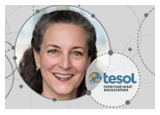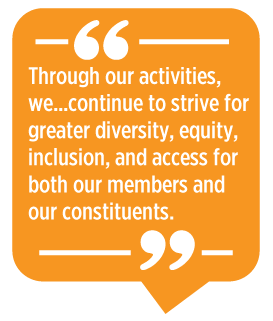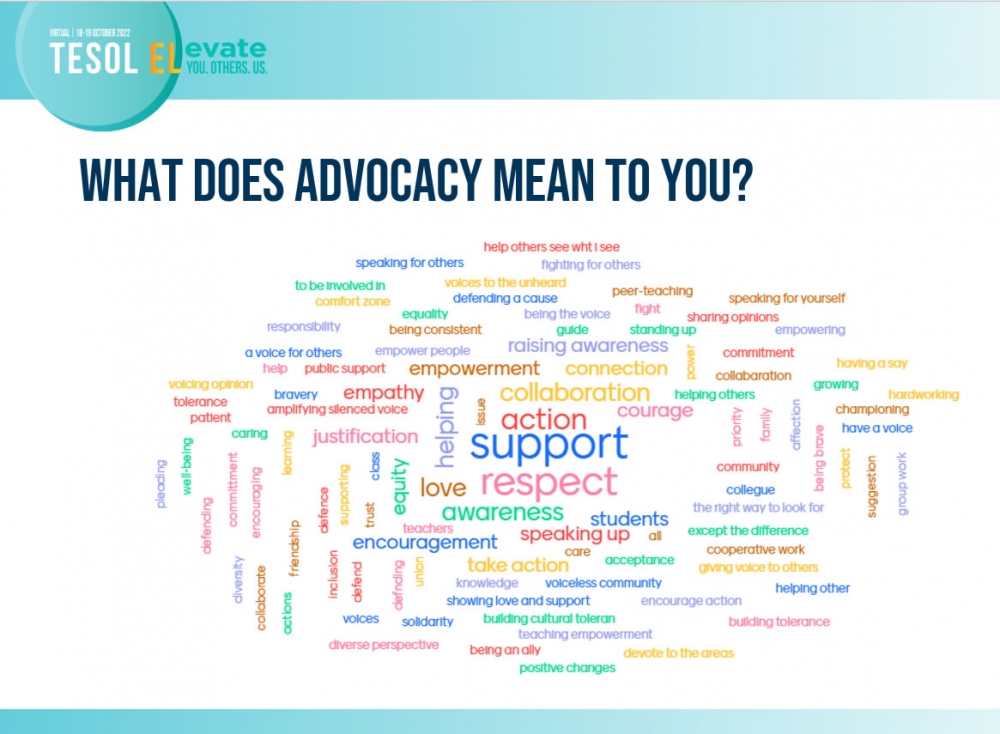TESOL Board Connect: Recovery, Discovery, and Moving Forward
by Joyce Kling
 Transition offers us a time to reflect. So, as my term as
TESOL president comes to an end, I would like to take this opportunity to share
some thoughts about the joint accomplishments and goals of my colleagues on the
board of directors, our executive director Amber Kelleher, the TESOL staff, and
the extensive range of volunteers around the world—and the work of our
association.
Transition offers us a time to reflect. So, as my term as
TESOL president comes to an end, I would like to take this opportunity to share
some thoughts about the joint accomplishments and goals of my colleagues on the
board of directors, our executive director Amber Kelleher, the TESOL staff, and
the extensive range of volunteers around the world—and the work of our
association.
Every 3 years, the board of directors revisits the
mission and vision of the association and sets a course. Last year was one of
these years. In the fall of 2022, the board ratified a new strategic plan, or
more accurately, the TESOL
Strategic Direction. In an innovative fashion, this agile framework
for 2023–2025 was built through open discussion with TESOL directors, volunteer
leaders, and members. It includes eight overarching priorities:

Figure 1. 2023–2025 TESOL Strategic Direction
priorities.
(Click here to enlarge)
Over the years, with the development of TESOL’s
strategic plan, our mission statement has been edited and amended, but the
focus has remained consistent. However, our approach is not just old wine in
new bottles. On the contrary, through our activities, we address contemporary
issues and continue to strive for greater diversity,
equity, inclusion, and access for both our members and our
constituents. Our priorities drive all our activities and initiatives. Therefore,
in developing the strategic direction, the directors also revisited TESOL’s
mission
statement. As a group, the board has emphasized the need for the
ever-expanding global perspective required of English language teaching (ELT)
professionals and the need to advance “professional expertise in English
language teaching to speakers of other languages in multilingual contexts
worldwide through professional learning, research, standards, and advocacy.”
How we achieve our mission has always been a key challenge at all levels of the
association.
 My reflections on my own experience as a TESOL
volunteer leader, long before I was on the board of directors, reminded me of a
previous approach to meet this challenge. Just over 20 years ago, I served as
chair of the then board standing committee on sociopolitical concerns (SCC). At
the time, a standing committee was similar in nature to our current professional
councils—a group of volunteers assembled by the executive committee
(president-elect, president, past president, and executive director) who worked
to support the board and the association. The SCC had had a charge to uphold
the elements of the association’s mission and focus on fostering effective
communication in diverse settings while respecting individuals’ language
rights. In reviewing documents from that time, I came across a letter I had
written to interest sections leaders, as well as TESOL members at large. In
2002, the world had only just begun to interact by email, and the opportunity
to reach out quickly to all our members was a fantastic opportunity. Thus, with
great enthusiasm, I sent a message on behalf of the SCC requesting input for
the committee’s agenda. In reviewing the letter recently, I realized that the
content of the letter is as relevant now as it was then. What made this message
noteworthy to me was a list of actions included that the SCC members were
charged with to successfully meet their goal, namely to “listen, give voice,
educate, link, activate, and provoke thought.”
My reflections on my own experience as a TESOL
volunteer leader, long before I was on the board of directors, reminded me of a
previous approach to meet this challenge. Just over 20 years ago, I served as
chair of the then board standing committee on sociopolitical concerns (SCC). At
the time, a standing committee was similar in nature to our current professional
councils—a group of volunteers assembled by the executive committee
(president-elect, president, past president, and executive director) who worked
to support the board and the association. The SCC had had a charge to uphold
the elements of the association’s mission and focus on fostering effective
communication in diverse settings while respecting individuals’ language
rights. In reviewing documents from that time, I came across a letter I had
written to interest sections leaders, as well as TESOL members at large. In
2002, the world had only just begun to interact by email, and the opportunity
to reach out quickly to all our members was a fantastic opportunity. Thus, with
great enthusiasm, I sent a message on behalf of the SCC requesting input for
the committee’s agenda. In reviewing the letter recently, I realized that the
content of the letter is as relevant now as it was then. What made this message
noteworthy to me was a list of actions included that the SCC members were
charged with to successfully meet their goal, namely to “listen, give voice,
educate, link, activate, and provoke thought.”
Though the SCC has long been dismantled, not to
mention board standing committees overall, the mandate of the SCC thrives
within TESOL and has grown and developed into a broad-based platform and focal
point in our mission. The association has expanded its outreach and works to
advocate for our stakeholders around the world. The past year has been one of
recovery and discovery. Political unrest and social inequity, not to mention
the lingering remnants of the pandemic, have challenged all of us at every turn
(personally and professionally).
With this in mind, at each of our virtual events,
TESOL leaders and staff have invited members to share their ideas of paths for
moving forward. For example, at TESOL
ELevate 2022, our virtual online event for primary and secondary
school teachers, TESOL’s director of advocacy and public policy, Jeff Hutcheson,
reached out to attendees and asked them to put into words who or what they
advocate for in their work. The responses spanned from advocating for students
to be taught life skills, like leadership, communication, and critical
thinking, to promoting job opportunities for nonnative-English-speaking
colleagues at local institutions. Discussions at the event resulted in the word
cloud shown in Figure 2; the sentiments mirror the aforementioned SCC actions
from 2002, with terms like support, respect, action, and empowerment at the
center.

Figure 2. TESOL ELevate 2022 word cloud.
(Click here to enlarge)
This early career member discussion at this event
was followed up with a more formal presentation of TESOL’s advocacy work for
the board of directors. In his presentation to the board, Jeff outlined the
activities and workshops he has been developing, building on the work of
previous TESOL colleagues. The ensuing discussion has been simultaneously
exhilarating and challenging.
All this leads my thoughts back to the SCC letter
and the committee’s charge. The designated charge, though pertinent to the work
of the former standing committee, is more important than ever in 2023. Thus,
regardless of your professional experience or your position in the association,
I invite you to consider an updated edition of this call to action for
advocating in our field:
-
Listen: Serve as
ears for all ELT stakeholders and our association.
-
Give voice: Ensure a
variety of voices are both heard and have opportunities to be heard.
-
Educate: Define,
frame, prioritize, and share issues at all levels of the association.
-
Link: Act as a
communication bridge, connecting voices and members and groups with like or
related concerns.
-
Activate: Facilitate
members’ ability to take action through open channels of
communication.
-
Provoke thought:
Move members and leaders to weigh and consider issues from new and different
angles.
These action points link directly to our strategic
direction and our eight key priorities. Though we may not always meet our
goals, these points provide us with a tools for the future. Even more, I
believe these highlight the timeless nature of our work.
As I transition to the rank of TESOL
past president, I anticipate a range of future opportunities to advocate for
and support TESOL’s members around the globe. I would like to thank you all for
electing me to serve as president for 2022–2023. In the coming year and beyond,
I look forward to TESOL’s future initiatives and opportunities to listen, give
voice, educate, link, activate, and provoke thought.
Joyce
Kling, PhD, is a senior lecturer at Lund
University in Sweden, where she teaches second language teacher education
courses to preservice and in-service teachers. Over the course of her career,
she has worked as an English language ESL and EFL teacher, program director and
administrator, teacher trainer, researcher, materials developer, author, and
consultant. Her research interests include English as medium of instruction
(EMI), teacher cognition, and language testing and assessment. Her work appears
in TESOL Quarterly, Journal of English-Medium
Instruction, as well as several edited volumes and monographs. The
most recent publication is a coauthored monograph entitled The
Evolution of EMI Research in European Higher Education (2022,
Routledge). She is currently TESOL International Association president
(2022–2023).